The government through the USAID has launched a 3-year project to address productivity, post-harvest management of African Indigenous Vegetables (AIV).
The project is being funded by USAID Feed the Future Horticulture Innovation Lab to the tune of Ksh 104.2 million (USD750,00) in the next three and a half years and will involve AIVs smallholder farmers specifically women and the youth.
This project is also being carried out by the research teams led by Kenya Agricultural Livestock Research Organization (KALRO), in collaboration with the University of Nairobi (UON) and the North Carolina State University (NCSU).
Speaking Saturday when launching the project, KALRO Director General Eliud Krieger said there is untapped potential for AIVs and therefore there is a need to enhance their productivity, streamline post-harvest management practices, and facilitate better market access.
“This initiative is not just about improving yields or increasing profits; it is about empowering our farmers, especially women, and youth, revitalizing rural communities, and promoting food security and nutrition for all Kenyans”, he said.
He noted that through collaborative efforts, the project will address various challenges that have hindered the full realization of the potential of indigenous vegetables from inadequate access to quality seeds and inputs to poor post-harvest handling techniques and limited market linkages.

“By harnessing the inherent resilience and adaptability of AIVs, we can build a more resilient and diversified agricultural system that is better equipped to withstand the challenges of climate change and other external shocks”, Dr. Kireger said.
The DG explained that Indigenous Vegetable is one of the prioritized value chains under BETA for food and nutrition security; and income generation as well as a priority value chain in County Integrated Development Plans for both Kisii and Kakamega Counties where the Connecting Research, Education, and Outreach (CREdO) programme will be undertaken on a pilot basis.
Dr. Penina Yumbya East Africa Horticulture Regional Hub Manager said that as a host organization for the Feed the Future Innovation Lab the channel through which USAID is funding the project it was a long process that targeted Kenya, Uganda, and Ethiopia, and proposals were done by over 55 organizations from the region.
“The process of reviewing ended up with us picking only 3 projects from the 55 proposals and one of them was the KALRO one on AVLs”, she said adding that the project is ideal as the PIs will be working directly with the small-scale farmers and also the youth.
“Our end goal, and what we are looking forward to is that after 3.5 years, we will have an impact on the lives of those people we are working with to enhance their lives of course, in terms of nutrition and economic empowerment”. Dr. Yumbya said.
In Kenya, African Indigenous Vegetables (AIVs) are primarily cultivated by smallholder female farmers, particularly in urban areas where commercialization efforts are increasing. However, challenges such as seasonality low productivity, and post-harvest losses imped meeting the rising demand.
There are over 210 AIV species that play a critical role in addressing micronutrient deficiencies due to their rich natural content. Indigenous Vegetable are also one of the prioritized value chains under BETA for food and nutrition security; and income generation,
By KNA

